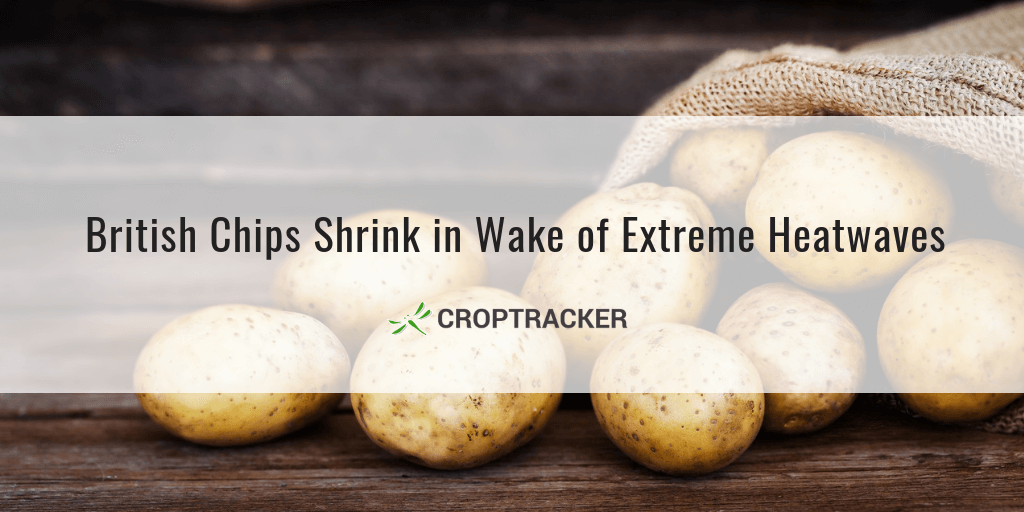British chips (otherwise known around the world as "fries") were shorter in 2018 after extreme heatwaves left UK crops parched over the summer months. A lighter-than-usual snack may be seem like a superifical issue, but it's indicative of a problem that threatens to bring sweeping changes to the British produce industry and its growers.
A new analysis conducted by the Climate Coalition network and the University of Leeds found that the popular British potato snack were an inch (2.5 cm) shorter on average compared to previous years. The analysis, titled "Recipe for Disaster: How climate change threatens British-grown fruit and veg", explores how rising global temperatures and associated unpredictable weather were likely to impact British crop production and increase the scarcity of produce in the country.
The shrinking chips are symptomatic of the poor 2018 potato yield in England and Wales, which was a fifth smaller than in previous years due to extreme heat. (Carrot production also fell by up to 30% and onions by 40% for similar reasons.) The analysis concluded that if current rates continue, the amount of land that is well-suited to growing potatoes could decline by 3/4 by the middle of the century. Either way, head of horticulture at the National Farmers Union (NFU) Lee Abbey states that "farmers and growers are used to dealing with fluctuations in the weather but if we have two or three extreme years in a row it has the potential to put growers out of business."
Gareth Redmond-King, head of Climate Change at coalition member World Wildlife Fund (WWF), said: “To be able to enjoy our mash, chips or jackets for years to come, we need to take measures to tackle climate change urgently. If we don’t, then the impact on both growers and consumers is just one of the ways our lives will change in a world of climate breakdown.”
Meanwhile, more than 50% of UK growers reported being affected by severe flooding or storms over the past 10 years, as rainfall intensity continues to mount. The prospect of warmer summers and milder winters also raises concerns that new pests and diseases will begin to affect the nation's crops.
The UK government has pledged to reward growers who help cut emissions and protect the environment under its new agriculture scheme, as seen in the September 2018 policy statement "Health and Harmony: The Future for Food, Farming and the Environment in a Green Brexit".
According to the statement:
The government will work with farmers and land managers who wish to improve the environment by entering into environmental land management contracts, which could span several years. These contracts will make sure that the environmental benefits farmers help deliver, but which cannot be sold or bought, are paid for by the public purse. These will include:
- Helping deliver high air and water quality
- Protecting and enhancing biodiversity on their land, by providing habitats for wildlife, for example
- Preventing, reducing and adapting to climate change and other environmental hazards like flooding and drought. Planting trees, for example, can help reduce flood risk and sequester carbon to help mitigate climate change.
- Providing public access to their land and contributing to the public’s understanding and enjoyment of nature. We will also look at specific incentives to increase access for disabled or disadvantaged groups
- Protecting our rural historic environment and our distinctive landscape features
In sharp contrast to the inflexible nature of the current system, these contracts will be based on a land management plan developed by the farmer or land manager. Their plan will set out how they intend to deliver the environmental benefits identified, based on guidance and specialist advice.
As Britain's environment secretary Michael Gove says, “High-quality, locally-grown fruit and veg are a crucial component of British diets. Yet, as we saw with last year’s drought, this nutritious food, and the livelihoods of the hard-working farmers who grow it, are increasingly threatened by more extreme weather and increased pests and diseases as a result of climate change.”
Want a refresher on any of Croptracker's features? Head over to our Knowledge Base, where you'll find step-by-step tutorials as well as common troubleshooting tips and more. And as always, if you're ever stuck, never hesitate to e-mail us at support@croptracker.com or Live Chat with us by clicking the green speech bubble ![]() in your bottom right-hand corner. We're always happy to help you let Croptracker make your farm become more efficient, safe, and profitable!
in your bottom right-hand corner. We're always happy to help you let Croptracker make your farm become more efficient, safe, and profitable!
| Missed Last Week's Blog Post? Organic Vegetable Production Jumped in 2018 |


